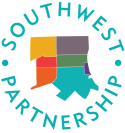Building Trades Union CHOICE Program (Melissa Wells)
CHOICE is a program of the Building Trades Unions in DC, Baltimore, and Northern Virginia that focuses on expanding access to apprenticeships in historically underserved communities, to people of color, women, veterans, and people experiencing re-entry. It is based on successful models in other cities, and uses an apprenticeship readiness model which includes math remediation and an introduction to the construction industry. CHOICE is looking for community partners to provide needed services and partner with CHOICE to leverage resources to implement projects. A major challenge for many people to begin apprenticeship programs is not having the math skills needed.
Professions in the Building Trades Unions include electricians, sheet metal workers, laborers, plumbers, steam fitters, carpenters, bricklayers, and masons.
CHOICE differs from Project Jumpstart in that there is a guaranteed pipeline to employers through the apprenticeship program, and apprenticeships take 2-5 years. The goal would be for graduates of programs like Jumpstart and the programs at the Jane Addams Resource Center to begin the apprenticeship programs.
The pay for a first year apprentice is $17 an hour, including full health care. Apprentices also begin paying into a pension. A journeyperson would make $40-$5 an hour.
Criteria for selection for the apprentice program includes an interview with managers and contractors, a math test, a GED or high school diploma, and having a driver’s license. A criminal background isn’t an issue for the union, but may be for employers.
Lou asked about the differences in career outcomes of union and non-union construction workers, given that union workers have a higher rate of pay, but may be out of work (‘on the bench’) more often. Melissa doesn’t know of any differences and believes that the differences tend to balance out. Additionally, they hire apprentices based on projected projects.
Job Training Programs Update
Bon Secours Community Works, which is the largest workforce provider in the area, was funded through MOED’s One Baltimore for Jobs Grant for a CNA/GNA training program. They have 25 spots per cohort, and have had more than 200 applicants. Although they currently can’t share information about individuals who applied, the biggest barriers for people to get into the program were:
- Criminal backgrounds, which would have made being hired at a hospital difficult
- Ellen had a question about the types of backgrounds that would make someone ineligible for being hired at a hospital. Although there aren’t necessarily hard and fast guidelines, in Joann Williams’ experience at UMMS the biggest issues are theft, assault, and fraud–because of the close contact with patients and families and access to medical records.
- TABE Test results were too low. Community Works is doing an Adult Basic Education reboot every Friday from 9am-3pm. There is not enough room in the program for everyone who needs it. Lisa suggested that the Roundtable could collaborate to provide additional math tutoring.
- Karen Kopp: the Housing Authority of Baltimore City is partnering with BCCC to provide educational sites in the city.
- Candidates had poor interviewing skills. Volunteers are needed to do mock interviews. Darryl, Michael, Yusef, and Lisa will do interviews, and Elizabeth will send the request to the larger Roundtable. Darryl and Lou had suggestions for other interview training resources, and Lisa will connect them to Bon Secours.
Career Fairs at Schools
Jeanne Cooper is organizing a career fair at Historic Samuel Coleridge Taylor from 3-5pm on April 28th. They will send flyers home with the students and make robocalls. The goal is to have a chance for families to come into the school and learn about job opportunities that may be available. Lisa would like the Roundtable to plan similar events at the Southwest Partnership area schools.
Program and Project Updates
Karen Kopp and Beryl Whipple from HABC are present. They work in the resident services division and provide services to residents of public housing and Section 8 housing throughout the city. They have a number of upcoming events (the flyers to which are attached), and are also applying for funding for Gilmor Works, a program based out of Gilmor Homes in a new community center which would provide community coaching and mentorship, job readiness, and job placement which will not lead to a rise in rent. Karen will connect the resident services staff member at Poe Homes, Russell Bun, to the Roundtable.
Darryl had questions about where to refer men he is mentoring who have children and are in need of housing services. Ellen will send Elizabeth information about Paul’s Place’s housing services. Bon Secours also has an eviction prevention program, and the Housing First effort through the Mayor’s Homeless Services program.
The UMB Community Engagement Center will be having their grand opening on Saturday April 16th, which will include a ribbon cutting at 9:30, a health fair, a moon bounce, and face painting.

